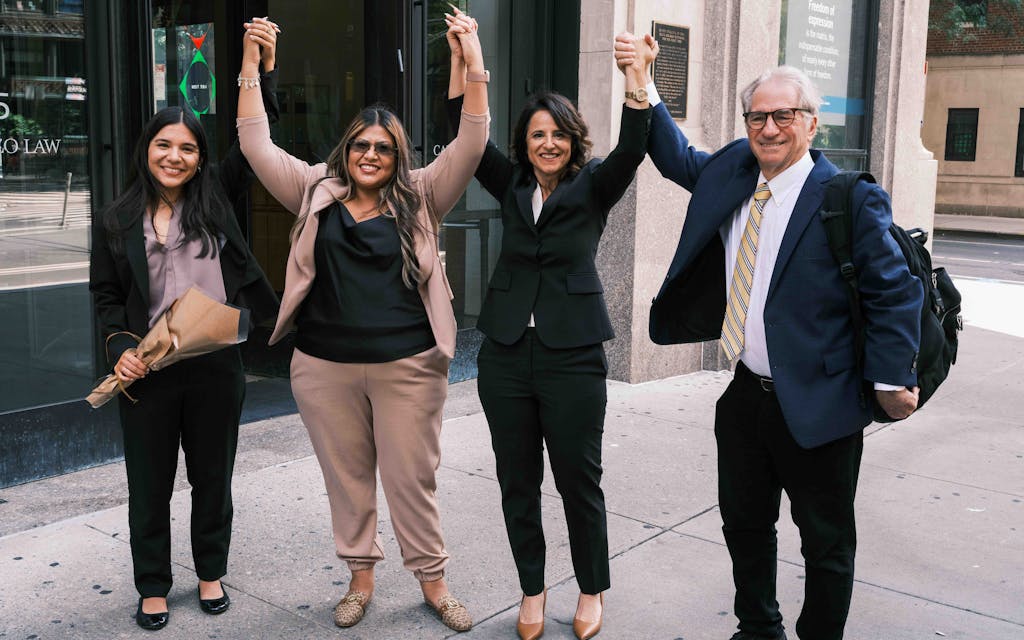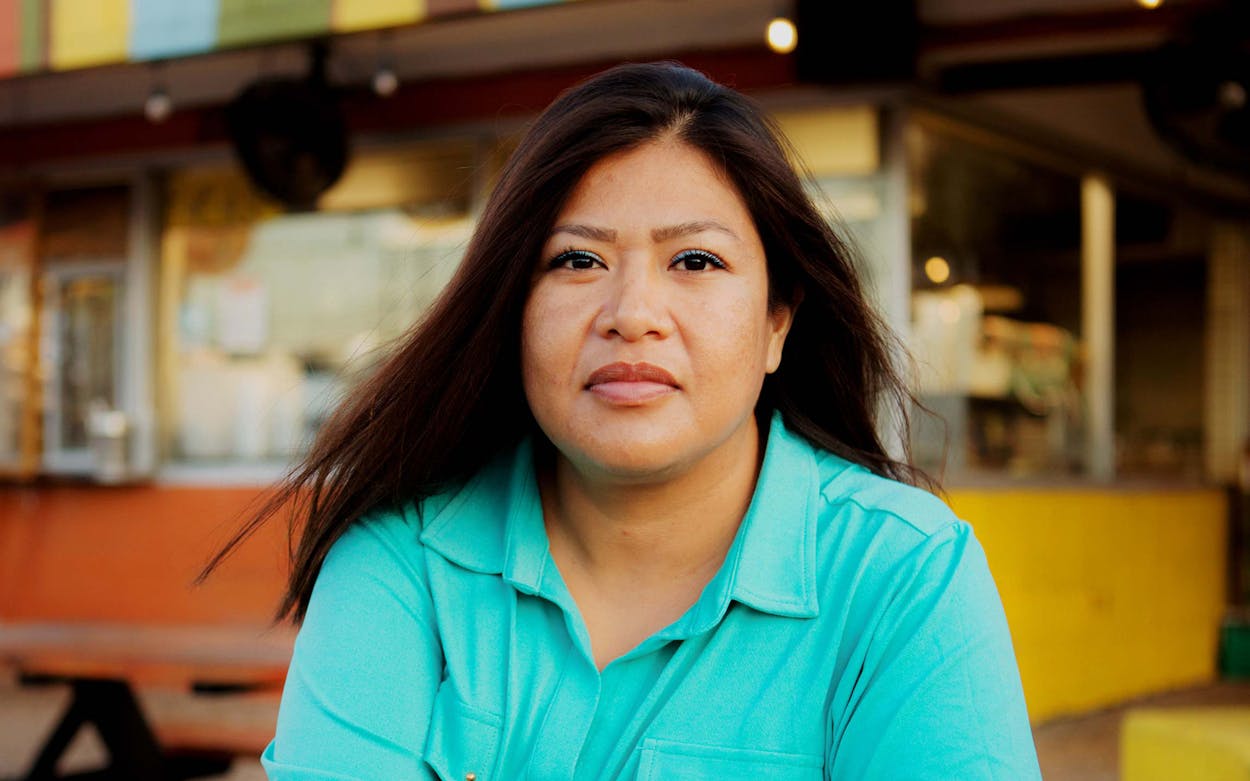Minutes after she was exonerated for murder on Monday, Rosa Jimenez became a grandmother. First, Jimenez, 41, sat in a room in Manhattan between her lawyers, Vanessa Potkin and Barry Scheck of the Innocence Project, the New York–based nonprofit that helps free inmates who have been wrongly convicted, as Judge Karen Sage of the 299th Criminal District Court in Austin declared Jimenez innocent in the death of a little boy in 2003. Jimenez, over Zoom, watched and listened as Sage apologized “for the grievous injury that has been done to you in the name of criminal justice.” Then, during a press conference that followed, Jimenez began getting texts from her daughter Brenda’s husband. Baby Alexia was born at 11:33 a.m. Sitting there, Jimenez felt like she was living in a dream. She hadn’t slept the night before—Brenda, in College Station, had gone into labor in the wee hours and Jimenez, from her New York hotel bed, had talked with her through the night. “I could tell she was scared,” Jimenez said into the microphone, “and I’m not able to be there right now with her.”
It was the end of an extraordinary 20-year legal and personal journey for Jimenez. In 2003, she was 20 and living in Austin, taking care of Brenda and sometimes another toddler, a 21-month-old named Bryan, for extra money. On January 30, she was babysitting Bryan when he suddenly began choking and then passed out. Paramedics tried to revive him and found a large wad of paper towels in his throat. The boy died, and Jimenez, a recent Mexican immigrant with no criminal record, was arrested. In almost no time, she went from an anonymous outsider to one of the most notorious murder defendants in Austin history, a woman accused of an unspeakable crime. There was no physical evidence that Jimenez had crammed the towels down the boy’s throat, and she swore the boy must have done it himself. The jury believed the police, ER doctors, and pediatricians who said that was impossible, and she got 99 years in prison.
But over the next decade and a half, Jimenez’s case went before numerous state and federal judges, who heard from experts who said that kids stuff all kinds of big things down their throats and that an accidental choking was more likely than a purposeful one. Twice, Jimenez was granted a new trial (one judge wrote that “justice and fundamental fairness” required that she get one) but both times the State of Texas fought back, so she never received one. By early 2020, no fewer than five judges had said that Jimenez was likely innocent.
Then, in January 2021, Sage of the 299th District Court held a hearing at which four experts in pediatric airways said that it was much more likely that the boy had swallowed the paper towels himself. Jimenez’s legal team, led by Potkin, asserted that false evidence had been given at the trial; this time Jimenez’s defense lawyers were joined by Travis County district attorney José Garza, who agreed that Jimenez had been wrongly convicted. Sage ruled Jimenez had been convicted on false evidence and that “clear and convincing evidence demonstrates that she is innocent.”
After she was released on bond in 2021—waiting for the court’s ruling to be affirmed or denied by the Texas Court of Criminal Appeals—the first thing Jimenez did was go to church. Five days later, she went to College Station to attend the wedding of her daughter Brenda, who had been taken from her arms when the girl was a year old. “The most important time of her life,” she had told me, her eyes filling with tears, “and I’m going to be there.” Jimenez also reconnected with her son Aiden, whom she had given birth to in the Travis County jail in 2003, at which point he was taken away. She was able to actually hug him now.
Jimenez set about living her life—first in Austin and then in San Antonio. A huge part of that life was dealing with stage-four kidney disease, which she had been suffering from since 2013. She started dialysis—but also researched how to get a transplant. The shy Jimenez also began dating Mary Flores from San Antonio, an outgoing, outdoorsy type. Jimenez had never walked on a beach, learned to swim, or gone fishing. Flores changed all that. “She really understands me,” Jimenez said. “She knows that I went to prison when I was really young and I didn’t know anything. I think she’s making it her job now. Like, we’re going to do something new every time.” In July, they married in San Antonio.
Then came yesterday’s hearing. In May, the CCA had finally ruled on Jimenez’s case, saying that while she deserved to have the charges thrown out, she hadn’t shown she was actually innocent, and the court sent the case back to Sage. On June 24, the district attorney jumped in, filing a motion to dismiss the case because Jimenez is indeed “actually innocent.” The final result was that, as soon as Sage dismissed the charges on Monday, Jimenez became officially exonerated and eligible for compensation under Texas law—up to $80,000 for each year she spent behind bars.
Potkin thinks Jimenez’s case is not an isolated one. “We have a real problem in this country in how we respond when a child is hurt or dies,” she said. “I am certain there are hundreds of caregivers and parents in prison today based on faulty, unscientific medical testimony that misclassified as crimes deaths that were actually caused by accidents or illness.”

What Jimenez really wants is a new kidney. In the days before the hearing, she had visited Weill Cornell Medicine in Manhattan—home to one of the best transplant programs in the country—to be evaluated for a kidney transplant. Jimenez is trying to find a living donor so she doesn’t have to go on the kidney waiting list, which could lead to a years-long wait. The center helped her set up a website with the National Kidney Registry. “I’m facing my next big battle,” she wrote on her page, “the fight for my life.”
When she was convicted twenty years ago, Jimenez was essentially alone in a Texas prison. Now she has numerous friends and supporters. One of her biggest fans is San Antonio Spurs coach Gregg Popovich, who watched the court hearing on Zoom. “The grace of this woman and the peace with which she seems to just keep moving on—she is amazing,” he told me Tuesday. Popovich has spoken publicly about her case and also sent Spurs fans to her kidney web page. “She desperately needs a live donor so she can get a kidney transplant. Help save her life.”
Jimenez’s dialysis treatments leave her exhausted. She had a treatment two days before the hearing, then she took an Uber back to her New York hotel. But the driver was forced to stop because of all the crowds watching the city’s summer half-marathon. So he let her out and she had to walk three blocks. The exertion left her drained, and she kept stopping to rest, watching the adults, kids, and onlookers in the crowds around her. The whole experience filled her with longing. “People were running with their kids, people were on bikes, and that really did something to me. I was just telling myself, ‘I want to be like one of those people, I want to be healthy. I want to do normal things.’ ”
She paused. “I’m excited for my future. I just hope I get a kidney and have a normal life. That’s all I want: a normal life.”








